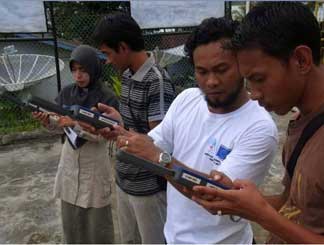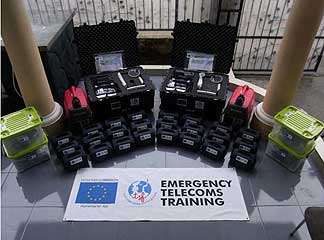
A Télécoms Sans Frontières (TSF) team was immediately deployed to Indonesia from its regional base in Bangkok, Thailand, at the request of the Office of the President of Indonesia and in coordination with the Indonesian government’s disaster management agency (BNPB). TSF deployment was facilitated by ASEAN (the Association of Southeast Asian Nations). In addition to the immediate assistance provided after the disaster, TSF worked in partnership with the European Commission (ECHO) to reinforce the islands’ disaster response system by providing emergency telecom kits to local relief organizations and training them in its use.
During the initial phase of the operation, the experts provided technical support to the emergency coordination center at Sikakap, the capital of the Pagai islands, by installing Internet connections and satellite phone lines which enabled 32 organizations to conduct a more efficient emergency response. TSF also provided a free phone service so that people affected by the disaster could make contact with their relatives. During this calling operation, the TSF team became aware of the severe logistic and communication challenges that organizations serving the Islands face, as the majority of the population live in areas that are hard to access.
Existing communication infrastructure on the Mentawai Islands is limited. On the Pagai islands, telecommunications were only available in the capital city Sikakap, these limited communication services became over-saturated which slowed down the ability of local organizations to assist affected communities.

The beneficiaries of this equipment were identified through close dialogue with local authorities and the humanitarian community. They were chosen based on their long-term commitment and experience in providing support to the Mentawai Islands as they have the capacity needed to support and sustain the equipment. TSF provided training to each organization to ensure that they will be able to use the equipment to conduct a more efficient and effective emergency response that will help meet the needs of people on the Mentawai Islands in the event of future disasters.
About the European Commission’s Humanitarian Aid Department (ECHO) The European Commission's Humanitarian Aid department (ECHO) is a service under the direct responsibility of Commissioner Karel De Gucht. Since the creation of its Humanitarian Aid Department in 1992, the European Commission has funded humanitarian aid missions that provide emergency assistance and relief to the millions of victims of natural disasters or armed conflict outside the European Union. The aid is intended to go directly to those in distress, irrespective of race, religion or political convictions. The European Union’s mandate to ECHO is also to promote the public awareness of humanitarian aid through actions carried out directly. Through ECHO funding, some 18 million people are helped each year through 200 partners (NGOs, ICRC, and UN agencies like the UNHCR and the WFP).

